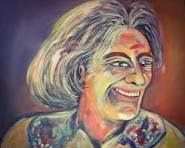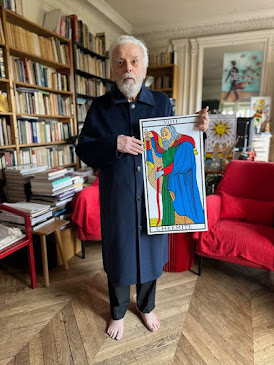January 2025 blog – Reflections Yaro
Michael Meade, my mentor, states that at the beginning: “This is not just the dark time of the year, but increasingly dark times for everyone, especially for those who care for the souls of other people and for the well-being of the Earth we all live on.” He goes on to describe how ancient symbols and practices at the Winter and Summer Solstice served as a reminder of the cosmological connection between the human soul and the hidden unity of life.
Symbols have the power to bring the mind and the heart
together and connect us to the deepest truths of life. A Christmas tree can
stand for the Tree of Life, as it represents both the still point at the center
and the power of life to change and renew itself. Simply lighting a single
candle in the midst of darkness can be a reminder of the eternal process of
renewal and restoration that is an essential, yet easily forgotten aspect of
all of life.
At this time, as we enter the new year - 2025, it is imperative for all humanity to connect to the images that indicate the hope and light we are beginning to reclaim from the darkness of wars, crises, and evil leaders.
The Tree of Life symbolizes interconnectedness, growth, and resilience across cultures and traditions. Its roots delve deep into the earth, representing grounding and connection to one's origins, while its branches reach toward the sky, symbolizing aspirations and spiritual growth. This balance teaches individuals the importance of staying rooted while striving for personal and collective development. People can benefit from its meaning by embracing life’s cycles, fostering unity with nature and others, and finding strength in adversity, inspiring personal growth and harmonious relationships.
THE MEANING OF JANUARY IN HISTORY
January (in Latin, Ianuarius) is named after Janus, the god of beginnings and transitions in Roman mythology.
Traditionally, the original Roman calendar consisted of 10
months totalling 304 days, winter being considered a month-less period. Around
713 BC, the semi-mythical successor of Romulus, King Numa Pompilius, is
supposed to have added the months of January and February, so that the calendar
covered a standard lunar year (354 days). Although March was originally the
first month in the old Roman calendar, January became the first month of the
calendar year either under Numa or under the Decemvirs about 450 BC (Roman
writers differ). In contrast, each specific calendar year was identified by the
names of the two consuls, who entered office on March 15 until 153 BC, at which
point they started entering office on January 1.
Various Christian feast dates were used for the New Year in
Europe during the Middle Ages, including March 25 (Feast of the Annunciation)
and December 25. However, medieval calendars were still displayed in the Roman
fashion with twelve columns from January to December. Beginning in the 16th
century, European countries began officially making January 1 the start of the
New Year once again—sometimes called Circumcision Style because this was the
date of the Feast of the Circumcision, being the seventh day after December 25.
Historical names for January include its original Roman
designation, Ianuarius, the Saxon term Wulf-monath (meaning "wolf
month"), and Charlemagne's designation Wintarmanoth ("winter / cold
month"). In Slovene, it is traditionally called prosinec; the name,
associated with millet bread and asking for something, was first
written in 1466 in the Škofja Loka manuscript.
SYMBOLS FOR JANUARY
Here is an essay by Michael Meade reflecting on the New Year 2025.
Although there can be no quick fix for all that troubles the world at this time, the aim of traditional New Year rites was to end the reign of the old year in order to begin everything anew. The idea was to follow the course of nature in which the world descends into darkness before the light and the energy of life begins to return.
The old idea was not simply the turning over of a calendar, but the understanding that a capacity for transformation and regeneration resides at the heart of nature, at the center of the cosmos and in the heart of humanity as well. The point was not to be naive and deny problems that must be faced, but to return to the origins of creation and symbolically participate in the capacity of life to renew itself.
For, small and insignificant as we may increasingly feel, we carry within our souls a spark that is connected to the galaxies and to the origins of creation. On one hand we are time bound, on the other we are secretly tied to eternal things that transcend the limits of time and place. By symbolically participating in the dissolution of time, ancient people were temporarily delivered from their faults and failings and had their original life potentials restored.
Although this primordial sense of rejuvenation and renewal does not remove suffering or injustice from the world, it becomes more important if we are to avoid overwhelm and navigate the chaotic and exhausting times in which we live.
We live amidst a shattering of paradigms that radically alter familiar patterns in both nature and culture. As the future of the Earth itself becomes increasingly uncertain the search for genuine knowledge begins with accepting the sense that we truly do not know what the New Year might bring. To find the kinds of insight and wisdom we most need, we must accept the condition of “not knowing” that parallels the uncertainty and darkness that appear before creation occurs.
Inside all stuck situations there is a deep vulnerability that can lead to a release of unexpected imagination and inspired ideas. In Zen Buddhist traditions the practice of shoshin translates as “beginner’s mind.” Shoshin begins where received ideas and accepted patterns are left behind as an innate capacity to awaken from within begins with “not knowing.” The open and humble attitude of a beginner makes us less likely to simply repeat old patterns of behavior.
While those who claim to be able to solve the complex problems we face may claim dogmatic certainty, the openness of the beginner is more likely to find the true nature of a situation. A principle idea in shoshin is that in the beginner’s mind there are many possibilities, but in the expert’s mind there are few. Thus, beginner’s mind offers a particular kind of wisdom based upon a willingness to be at the edge where life remains open to many possibilities and unrealized potentials.
In keeping with the sense of many possibilities, the ancient term for beginner’s mind has more than one meaning. Shoshin can also mean something or someone that conveys “genuine truth.” Thus, it can refer to a work of art or a person that is genuine and not a fake or an imitation. When we draw from the root of our deeper self, we become more authentic and able to act in alignment with the inner spirit and the genuine aim of our souls.
As a practice, beginner’s mind can also involve the sense of forgiveness. For only when we forgive ourselves for mistakes and misdeeds can we let go of the ties that bind us and be released from the need to repeat the mistakes of the past. In that sense, not knowing, being open to change and forgiving ourselves and others turn out to be key ingredients in seeking to rejuvenate, start anew and be able to imagine and contribute to a better world.
Something ancient and knowing is trying to catch up to us and being fully present when a moment in time breaks open to unseen possibilities depends upon practices like beginner’s mind that help us be authentic and original and able to start anew. In being more open and forgiving we become more able to unlock untapped capacities for creativity, flexibility, and resilience.
In the open moments of life, we become connected to the heart of nature again and can sense what the ancients meant in saying that all of life is sacred, and that can be a grace in the world and at the edge of every moment.

.jpeg%20TREE%20OF%20LIFE.jpeg)























